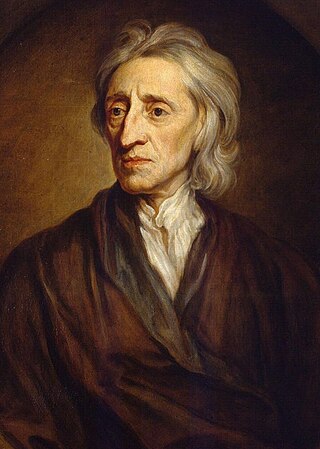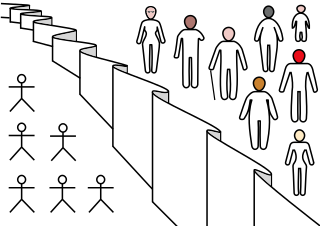Related Research Articles

John Locke was an English philosopher and physician, widely regarded as one of the most influential of Enlightenment thinkers and commonly known as the "father of liberalism". Considered one of the first of the British empiricists, following the tradition of Francis Bacon, Locke is equally important to social contract theory. His work greatly affected the development of epistemology and political philosophy. His writings influenced Voltaire and Jean-Jacques Rousseau, and many Scottish Enlightenment thinkers, as well as the American Revolutionaries. His contributions to classical republicanism and liberal theory are reflected in the United States Declaration of Independence. Internationally, Locke's political-legal principles continue to have a profound influence on the theory and practice of limited representative government and the protection of basic rights and freedoms under the rule of law.

Jurisprudence is the philosophy and theory of law. It is concerned primarily with what the law is and what it ought to be. That includes questions of how persons and social relations are understood in legal terms, and of the values in and of law. Work that is counted as jurisprudence is mostly philosophical, but it includes work that also belongs to other disciplines, such as sociology, history, politics and economics.
Natural law is a system of law based on a close observation of natural order and human nature, from which values thought by the proponents of this concept to be intrinsic to human nature can be deduced and applied independently of positive law. According to the theory of law called jusnaturalism, all people have inherent rights, conferred not by act of legislation but by "God, nature, or reason." Natural law theory can also refer to "theories of ethics, theories of politics, theories of civil law, and theories of religious morality."

Political philosophy or political theory is the philosophical study of government, addressing questions about the nature, scope, and legitimacy of public agents and institutions and the relationships between them. Its topics include politics, liberty, justice, property, rights, law, and the enforcement of laws by authority: what they are, if they are needed, what makes a government legitimate, what rights and freedoms it should protect, what form it should take, what the law is, and what duties citizens owe to a legitimate government, if any, and when it may be legitimately overthrown, if ever.

Property is a system of rights that gives people legal control of valuable things, and also refers to the valuable things themselves. Depending on the nature of the property, an owner of property may have the right to consume, alter, share, redefine, rent, mortgage, pawn, sell, exchange, transfer, give away, or destroy it, or to exclude others from doing these things, as well as to perhaps abandon it; whereas regardless of the nature of the property, the owner thereof has the right to properly use it under the granted property rights.

Thomas Hobbes was an English philosopher. Hobbes is best known for his 1651 book Leviathan, in which he expounds an influential formulation of social contract theory. In addition to political philosophy, Hobbes contributed to a diverse array of other fields, including history, jurisprudence, geometry, theology, and ethics, as well as philosophy in general. He is considered to be one of the founders of modern political philosophy.

In moral and political philosophy, the social contract is an idea, theory or model that usually, although not always, concerns the legitimacy of the authority of the state over the individual. Conceptualized in the Age of Enlightenment, it is a core concept of constitutionalism, while not necessarily convened and written down in a constituent assembly and constitution.
Will, within philosophy, is a faculty of the mind. Will is important as one of the parts of the mind, along with reason and understanding. It is considered central to the field of ethics because of its role in enabling deliberate action.

The original position (OP), often referred to as the veil of ignorance, is a thought experiment used for reasoning about the principles that should structure a society based on mutual dependence. The phrases original position and veil of ignorance were coined by the American philosopher John Rawls, but the thought experiment itself was developed by William Vickrey and John Harsanyi in earlier writings.

Leviathan or The Matter, Forme and Power of a Commonwealth Ecclesiasticall and Civil, commonly referred to as Leviathan, is a book written by Thomas Hobbes (1588–1679) and published in 1651. Its name derives from the biblical Leviathan. The work concerns the structure of society and legitimate government, and is regarded as one of the earliest and most influential examples of social contract theory. Written during the English Civil War (1642–1651), it argues for a social contract and rule by an absolute sovereign. Hobbes wrote that civil war and the brute situation of a state of nature could be avoided only by a strong, undivided government.
Some philosophers distinguish two types of rights, natural rights and legal rights.

Negative liberty is freedom from interference by other people. Negative liberty is primarily concerned with freedom from external restraint and contrasts with positive liberty. The distinction originated with Bentham, was popularized by T. H. Green and Guido De Ruggiero, and is now best known through Isaiah Berlin's 1958 lecture "Two Concepts of Liberty".

Sir Robert Filmer was an English political theorist who defended the divine right of kings. His best known work, Patriarcha, published posthumously in 1680, was the target of numerous Whig attempts at rebuttal, including Algernon Sidney's Discourses Concerning Government, James Tyrrell's Patriarcha Non Monarcha and John Locke's Two Treatises of Government. Filmer also wrote critiques of Thomas Hobbes, John Milton, Hugo Grotius and Aristotle.
Early modern philosophy The early modern era of philosophy was a progressive movement of Western thought, exploring through theories and discourse such topics as mind and matter, is a period in the history of philosophy that overlaps with the beginning of the period known as modern philosophy. It succeeded in the medieval era of philosophy. Early modern philosophy is usually thought to have occurred between the 16th and 18th centuries, though some philosophers and historians may put this period slightly earlier. During this time, influential philosophers included Descartes, Locke, Hume, and Kant, all of whom contributed to the current understanding of philosophy.

Two Treatises of Government is a work of political philosophy published anonymously in 1689 by John Locke. The First Treatise attacks patriarchalism in the form of sentence-by-sentence refutation of Robert Filmer's Patriarcha, while the Second Treatise outlines Locke's ideas for a more civilized society based on natural rights and contract theory. The book is a key foundational text in the theory of liberalism.

Discourse on the Origin and Basis of Inequality Among Men, also commonly known as the "Second Discourse", is a 1755 treatise by philosopher Jean-Jacques Rousseau, on the topic of social inequality and its origins. The work was written in 1754 as Rousseau's entry in a competition by the Academy of Dijon, and was published in 1755.

The labor theory of property is a theory of natural law that holds that property originally comes about by the exertion of labor upon natural resources. The theory has been used to justify the homestead principle, which holds that one may gain whole permanent ownership of an unowned natural resource by performing an act of original appropriation.
In political philosophy, the right of revolution is the right or duty of a people to "alter or abolish" a government that acts against their common interests or threatens the safety of the people without justifiable cause. Stated throughout history in one form or another, the belief in this right has been used to justify various revolutions, including the American Revolution, French Revolution, the Russian Revolution, and the Iranian Revolution.
James Tyrrell was an English author, Whig political philosopher, and historian.
The philosophy of human rights attempts to examine the underlying basis of the concept of human rights and critically looks at its content and justification. Several theoretical approaches have been advanced to explain how and why the concept of human rights developed.
References
- ↑ de Vattel, Emer, The Law of Nations, Preliminaries. Idea and General Principles. §4.
- ↑ Adapted from Mei translation of the. Mozi . Retrieved 18 September 2017.
{{cite book}}:|website=ignored (help) - ↑ Hansen, Chad (2000-08-17). A Daoist Theory of Chinese Thought: A Philosophical Interpretation. Oxford University Press. pp. 158–162. ISBN 9780195350760.
- ↑ Hobbes, Thomas, Leviathan. 1651. Edwin Curley (Ed.) 1994. Hackett Publishing.
- ↑ Yurdusev, A. Nuri (June 2006). "Thomas Hobbes and international relations: from realism to rationalism" (PDF). Australian Journal of International Affairs. 60 (2): 305. doi:10.1080/10357710600696191. S2CID 214613777 . Retrieved 2 February 2016.
- ↑ Donelson, Raff (2017). "Blacks, Cops, and the State of Nature". Ohio State Journal of Criminal Law. 15 (1): 183–192. SSRN 2941467.
- ↑ Goldwin, Robert (March 1976). "Locke's State of Nature in Political Society". The Western Political Quarterly. 29 (1): 126–135. doi:10.2307/447588. JSTOR 447588.
- ↑ Skinner, Quentin. Visions of Politics. Cambridge.
- ↑ Translated by Thomas Nugent, revised by J. V. Prichard. Based on edition published in 1914 by G. Bell & Sons, Ltd., London. Rendered into HTML and text by Jon Roland of the Constitution Society, where the full text of this document may be found, Book 2
- ↑ "Hobbes vs Rousseau: Are We Inherently Evil or Good?". IAI TV - Changing how the world thinks. 2019-03-12. Retrieved 2019-10-17.
- ↑ Jean-Jacques Rousseau, A Discourse on Inequality
- 1 2 Hume, David (1739). A Treatise of Human Nature. Project Gutenberg. pp. Book III, Part II, Section II. Retrieved 2 February 2016.
- ↑ Hume, David (1739). A Treatise of Human Nature. Project Gutenberg. pp. Book II, Part III, Section I. Retrieved 2 February 2016.
- ↑ Calhoun, John C. (1851). A Disquisition on Government . In The Works of John C. Calhoun, edited by Richard K. Cralle. Vol. 1. New York: D. Appleton and Company, 1854. pp. 57–9.
- ↑ Rothbard, Murray N. (1977). "Robert Nozick and the Immaculate Conception of the State" (PDF). Journal of Libertarian Studies. 1, Num 1.: 45–47.
- ↑ Jorgensen, Malcolm (2020). American Foreign Policy Ideology and the International Rule of Law: Contesting Power through the International Criminal Court. Cambridge University Press. p. 2. doi:10.1017/9781108630658. ISBN 9781108481434. S2CID 216539635.